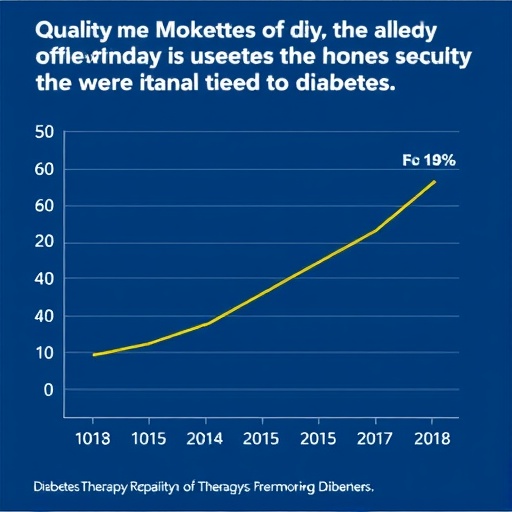A recent investigation into the interface between diabetes therapy-related quality of life (DTR-QOL) and overall mortality risk has revealed startling implications for patient care. Conducted as part of the Diabetes Distress and Care Registry at Tenri (DDCRT 26), this prospective cohort study authored by Nishioka et al. published in Diabetes Therapy, stands as a crucial contribution to diabetes management literature. The researchers endeavored to explore how the subjective well-being of patients undergoing diabetes treatment could influence their life expectancy, potentially reframing how healthcare providers approach these discussions with their patients.
The study entailed a robust methodology that involved multiple data points assessed over a significant time frame. Participants were carefully selected from a diverse demographic, reflecting various backgrounds and experiences with diabetes. The aim was to correlate the psychological and emotional factors influencing DTR-QOL with actual health outcomes, focusing on all-cause mortality rates. This correlation is vital, as it adds a new dimension to the understanding of how mental and emotional health intersects with physical health in chronic disease management.
A critical aspect of the study involved the use of well-validated tools to measure DTR-QOL, ensuring reliability and consistency in the data collected. The researchers employed standardized questionnaires that addressed both the physical burden of diabetes management and the emotional toll it can take on individuals. This dual-focus approach underscored the complexity of diabetes as not merely a physical ailment but also a significant psychological challenge. Their findings emphasize that improving the quality of life related to diabetes therapy may not only enhance daily functioning but also result in tangible health benefits.
Moreover, the study meticulously considered confounding factors that could skew the relationship between DTR-QOL and mortality outcomes. Variables such as age, sex, socio-economic status, comorbid conditions, and the duration of diabetes were rigorously analyzed. This attention to detail significantly strengthens the validity of the study’s findings, allowing for a clearer understanding of how DTR-QOL can be a predictive marker for patient prognosis.
The subsequent analysis revealed striking links; patients who reported higher DTR-QOL scores tended to have lower all-cause mortality rates. This correlation signals a paradigm shift in diabetes management strategies, suggesting that healthcare practitioners might need to integrate quality of life assessments into routine evaluations. By recognizing the importance of how patients feel about their treatment, providers can tailor interventions that not only address clinical concerns but also enhance patient satisfaction and engagement.
Furthermore, these findings may influence policy-making regarding diabetes care. As healthcare systems globally grapple with the challenge of chronic disease management, prioritizing quality of life could lead to more holistic and effective treatment approaches. Ultimately, this study calls for a re-evaluation of current paradigms in diabetes care, advocating for a more life-centric view of chronic management strategies.
The implications of such research extend beyond individual patient care; they can reshape public health initiatives aimed at reducing diabetes-related complications and mortality. By advocating for comprehensive assessments that include mental and emotional health, stakeholders can better allocate resources and design programs that bolster overall patient well-being. The potential to extend life through improved quality of life is a compelling argument for change within health systems.
The research team anticipates that their findings will inspire further exploration into the relationship between mental health, quality of life, and chronic disease management. Future studies could delve deeper into specific interventions designed to improve DTR-QOL—be it through counseling, peer support, or patient education programs—that could further enhance the findings that have surfaced in this study.
Critically, the study also raises questions about how healthcare education can evolve. Educating patients about the importance of their quality of life, alongside the clinical aspects of diabetes management can empower better health choices. Engaging patients in their health journey is essential; this shift may very well constitute the foundation upon which more effective diabetes management strategies are built.
In conclusion, Nishioka et al.’s exploration of DTR-QOL and its implications for mortality risk presents compelling evidence for a shift in focus within diabetes care. By recognizing and addressing the quality of life associated with diabetes therapies, healthcare providers can potentially enhance patient outcomes significantly. This study not only provides a framework for understanding the multifaceted nature of diabetes management but also serves as a call to action for a more compassionate and nuanced approach to chronic disease treatment.
As diabetes continues to be a growing healthcare challenge globally, this research offers a glimmer of hope, demonstrating that enhancing the patient experience is not just beneficial; it is essential in addressing the complexities of diabetes management and improving longevity.
Subject of Research: The relationship between diabetes therapy-related quality of life (DTR-QOL) and all-cause mortality risk.
Article Title: Association Between Baseline Diabetes Therapy-Related Quality of Life (DTR-QOL) and Subsequent Risk of All-Cause Mortality: A Prospective Cohort Study (Diabetes Distress and Care Registry at Tenri [DDCRT 26]).
Article References:
Nishioka, Y., Hayashino, Y., Kurosawa, K. et al. Association Between Baseline Diabetes Therapy-Related Quality of Life (DTR-QOL) and Subsequent Risk of All-Cause Mortality: A Prospective Cohort Study (Diabetes Distress and Care Registry at Tenri [DDCRT 26]).
Diabetes Ther 16, 1633–1648 (2025). https://doi.org/10.1007/s13300-025-01755-2
Image Credits: AI Generated
DOI: https://doi.org/10.1007/s13300-025-01755-2
Keywords: diabetes therapy, quality of life, mortality risk, chronic disease management, patient care.




